Watching, Being Watched, and Chipotle Couture
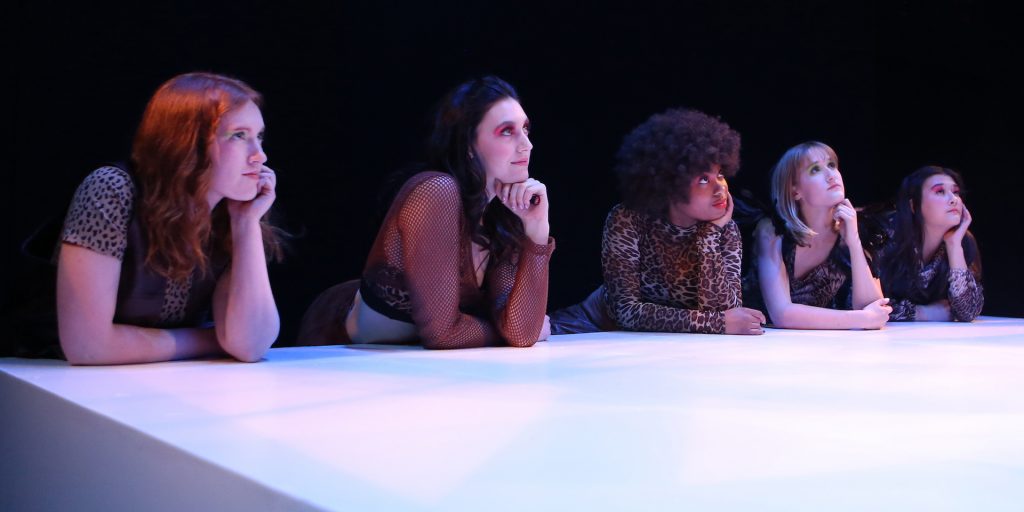
Models look on. Photo: Sue Kessler
By Kallan Dana
We’re in the 70s, and then we’re in the abstract present, and then we’re back to the 70s once more, and so on and so on, but the entire time we are consciously, inescapably in the theater. We, the audience, do not inhabit the spaces we see onstage—we watch them.
The actors know they are watched. Sheila Callaghan’s time-jumping Everything You Touch, directed by Rachel Karp ’18, begins with the ultimate event for watchers: a runway show. Five models emerge, one after the other, for our viewing pleasure. Without words, their bodies are all they are. They march across the stage, until the last one (Finley Martin ’19) falls. A man speaks down to her from a balcony above: “Piper. I am tired of your pretty, lyrical, thought-provoking face.” She crumples and looks away. “Pay attention please,” he snaps. The man, Victor (Caoilin O’Connor ’20), an elite ‘70s fashion designer, lives to decimate, to pick apart, to critique—all in pursuit of beauty. The focus of his comments, more often than not, is on the lacking. “You are not visionary. You are not fearless,” he drawls at the model, finishes his haranguing, and exits. The model picks herself up, glides offstage, and we watch, silently and stunned, as her silhouette steps up to backlit noose and she steps off.
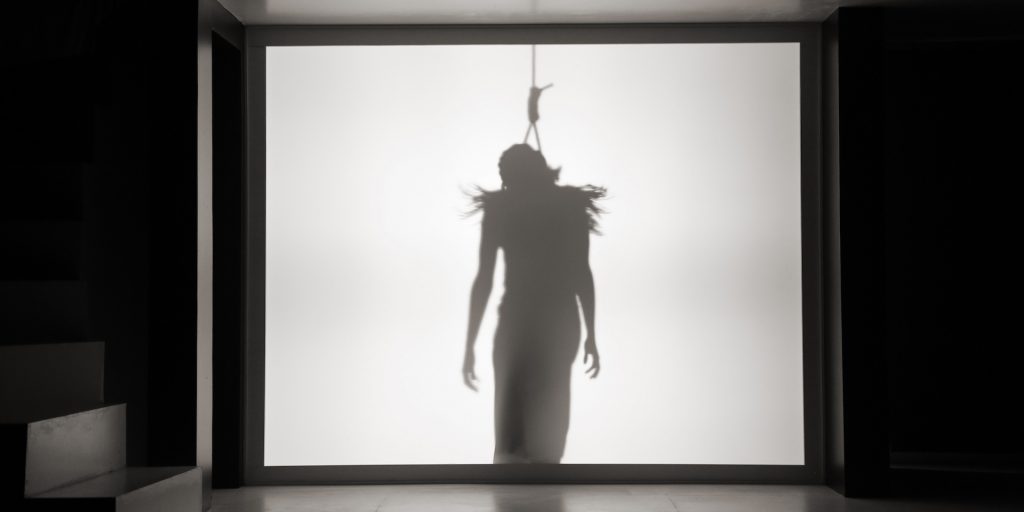
Finley Martin ’19 (Model). Photo: Sue Kessler
Start to finish, Karp and her all-student design team—lighting designer Omi Furst ’18, sound designer Max Helburn ’18, and scenic designer Sarah Markley ’19—build a world under a microscope, a spotless black and white gallery in which women are never enough. The world is divided by time: half of the action taking place in the 1970s East Village fashion world, half in the more contemporary early 2000s, but both decades converge together through the mind of Jess (Bianca Thompson ’19). Jess is not a model—not even close. She goes days without showering, slumps her shoulders, folds her body into itself. “I will never be something worth looking at…I’ll always be the one looking,” she claims, matter-of-factly.
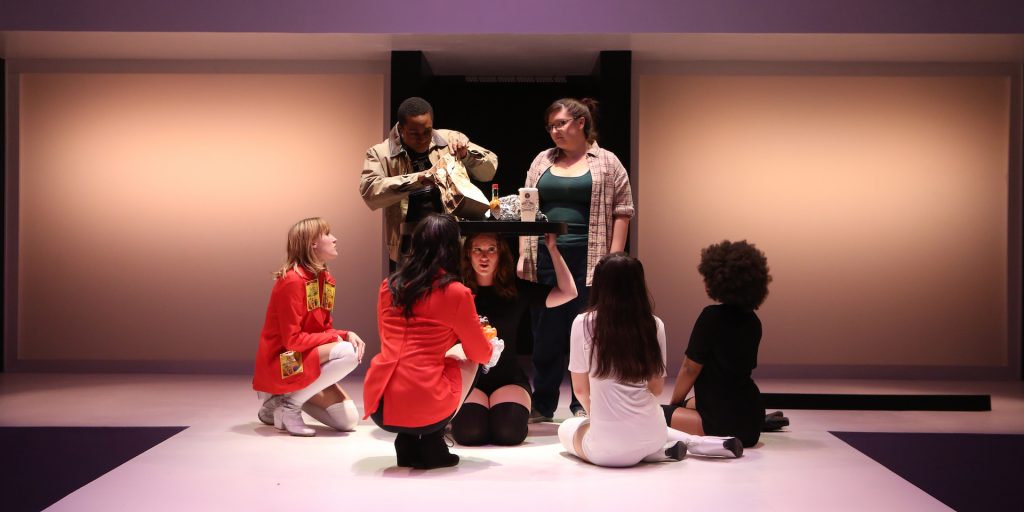
Bianca Thompson ’19 (Jess) and Kyle Thomas ’18 (Lewis) eat Chipotle as Models look on. Photo: Sue Kessler
Jess decided and has been told since long ago that she is not enough. And will never be enough to merit love, affection, viewership; instead, she finds evidence of her worthlessness hidden in everything. Under Karp’s skillful direction, the ‘70s models (Finley Martin ’19, Olivia Bagg ’19, Jessie March ’21, Miranda Coble ’19, and Brittany Kent ’18) become ever-present figures in Jess’ mind. She cannot escape the presence of these beautiful, perfect women, and they manifest as objects and setting everywhere Jess goes. Costume designer Leah Mirani ’18 turns the mundane into something sexy, something worthy of ogling, when placed on a model’s body. Jess sleeps and fucks in a bed built of models holding pillows, a frame, and blankets around her. She sits inside a car, tires being spun in the palms of these impossibly beautiful women. When she eats out at a Chipotle, the models strut across the stage, their bodies garnished with cups and chips stuck to their chests and stomachs. But these imaginary models are more than set-dressing for Jess, they circle around her like schoolgirls bullies. They taunt her, echoing the words of her remote mother. “You are so beautiful, Jess. And so skinny,” they speak in creepy simultaneity, interrupting Jess as she eats her burrito. “You are about a million times prettier than the other girls in your kindergarten class. I feel bad for them.”
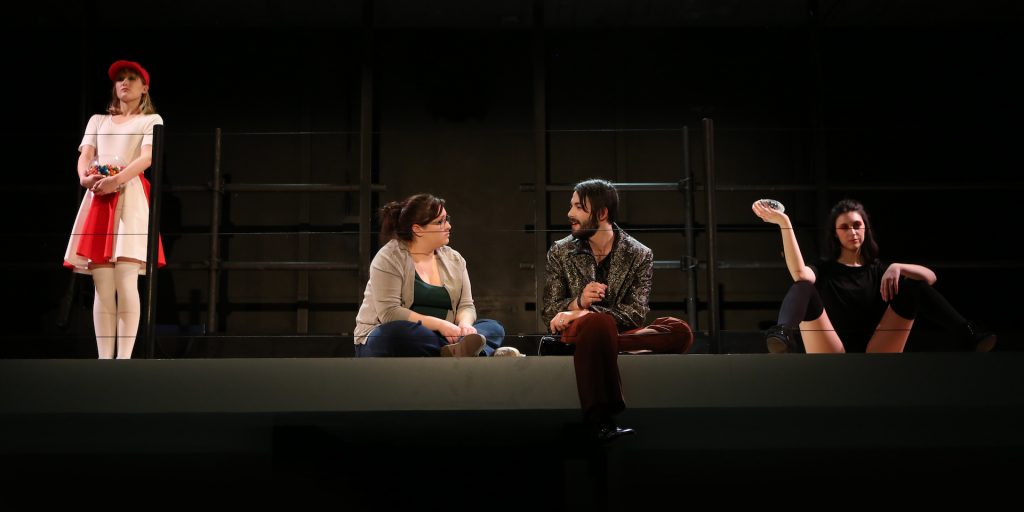
Bianca Thompson ’19 (Jess) and Caoilin O’Connor ’20 (Victor). Photo: Sue Kessler
But Jess’s mother, Esmé (Lucy Consagra ’18), never escaped this judgment or competition herself. We see her with Victor in the 70s—his longtime muse and lover. She is perfect, smoldering, confident, but can easily be replaced when Victor picks out a new toy. This time it is Louella (Lulu Fairclough Stewart ’19), a bright-eyed, unfiltered radio contest prize winner from Little Rock. Louella, like Jess, believes she will “never be something worth looking at,” but Victor endows her with beauty and so she becomes it—costing Esmé her own status and perfection. As Louella ascends to be Victor’s new doll, Esmé’s life transforms before her eyes. Eventually she herself moves to Little Rock to start a new, quieter existence with her and Victor’s daughter—Jess.
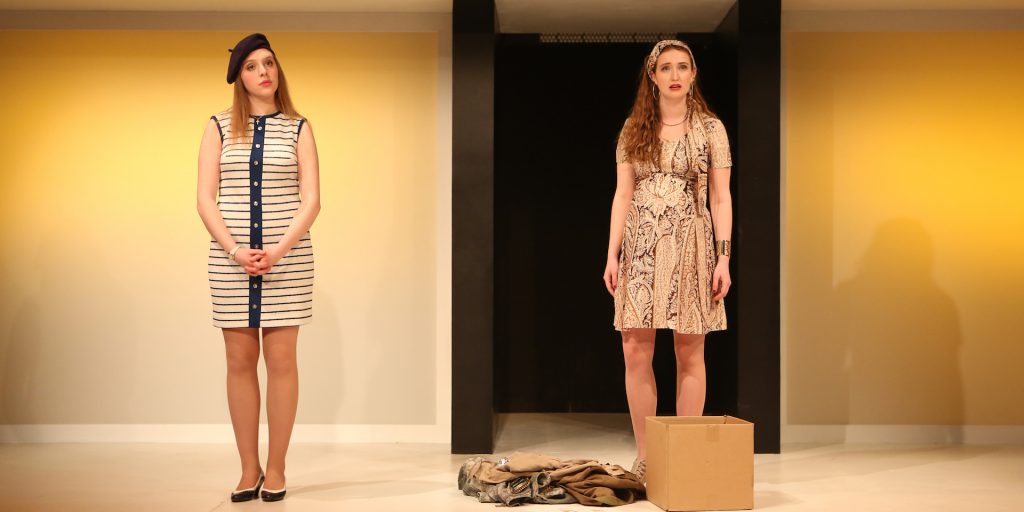
Lulu Fairclough-Stewart ’19 (Louella) and Lucy Consagra ’18 (Esmé). Photo: Sue Kessler
This childhood, as we come to learn, is why Jess remains stunted as an adult. Hating her body, and by extension, herself, she ignores the efforts and phone calls of Lewis (Kyle Thomas ’18), the only person in her life who loves her unconditionally. Instead, she imagines other people watching her, other people who can reinforce what her mother taught her—that she was beautiful only when she was a skinny child, that, as an adult with fat on her bones, she is a “pathetic pile of shit,” that “if her father were alive…he would be DISGUSTED by her.” So Jess not only creates five Esmé-like models to stare at her, she recreates her father to reinforce the hate her mother has taught her.

Kyle Thomas ’18 (Lewis) and Bianca Thompson ’19 (Jess). Photo: Sue Kessler
Jess’ imagined Victor accompanies her on her journey to find her dying mother, a journey that seems, at first, to be towards self-improvement. Victor encourages Jess to change herself from a “flawed person” into “something worth looking at.” But by the play’s end, it’s clear that Jess’s journey was not meant to change herself, but rather her attitude about herself. In her final moments on stage, the five models surround Jess once more, this time not as objects, nor as predators. They are watchers, but not to judge her for what she lacks. Instead, they show her to be something worth looking at for what she is and always has been.
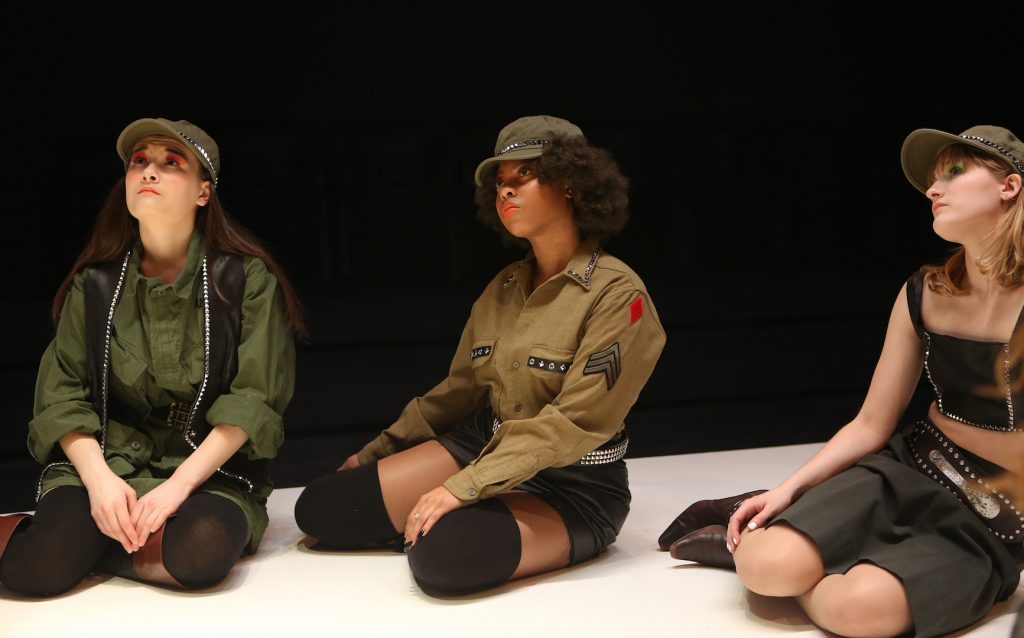
Jessie March ’21, Brittany Kent ’18, and Finley Martin ’19 (Models). Photo: Sue Kessler
The immaculate set the actors walk on and the gleaming lights they’re trapped under are the theatrical manifestations of the inescapable standards for all women’s bodies. “A woman’s body is constantly being evaluated,” says actor, Brittany Kent ’18. Olivia Bagg ’19 points out the irony in staging a play about reclaiming bodily confidence and autonomy when “as actors…we are constantly being type cast.” This irony, though, is key to the play’s success. At the end, the ten formidable actors emerge for a final, glitzy, runway curtain call. We ogle them, cheer for them, watch and look, look and watch. And then they stop, assume their positions on opposite ends of the catwalk, and look out at us. Soon they will bow, but in the seconds before doing so, they watch us. I sit up in my chair. I push my hair behind my ears. I cross my legs. I want to look nice. And then the actors smile, turn, saunter off, and I can relax and become a watcher once more.
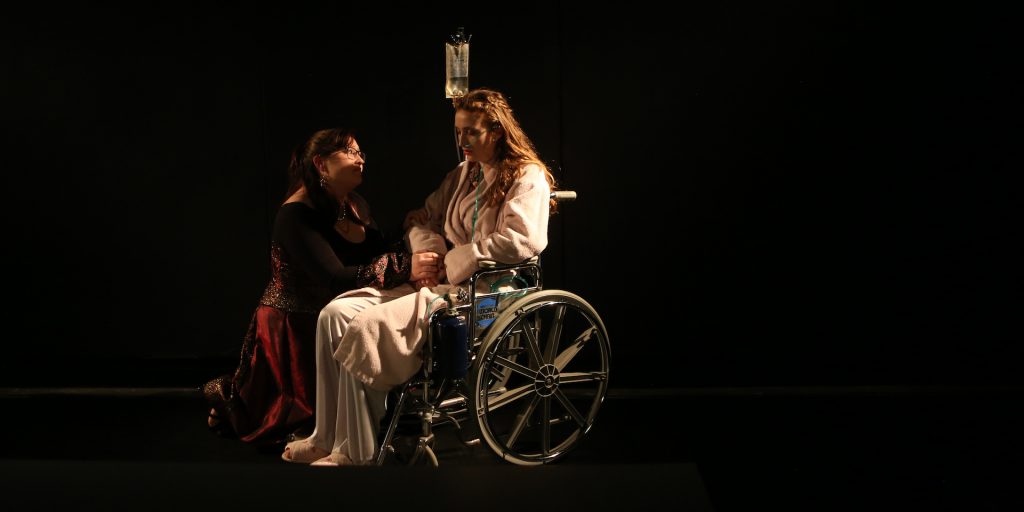
Bianca Thompson ’19 (Jess) and her mother Lucy Consagra ’18 (Esmé). Photo: Sue Kessler
How long have these power structures of watcher and watched been in place, and can we break them? Karp’s clean, sharp, fast-moving production does not provide decisive answers, but it offers hope. The glaring white of the lights, the regality of the set’s spiral staircases, the eye of a critical man, all have power because we give it to them. In her staging, Karp has made a show in which the false dichotomy of watcher and watched is erased, as all individuals enact both roles. She shows us that loving oneself is as simple and as impossible as deciding to do so.
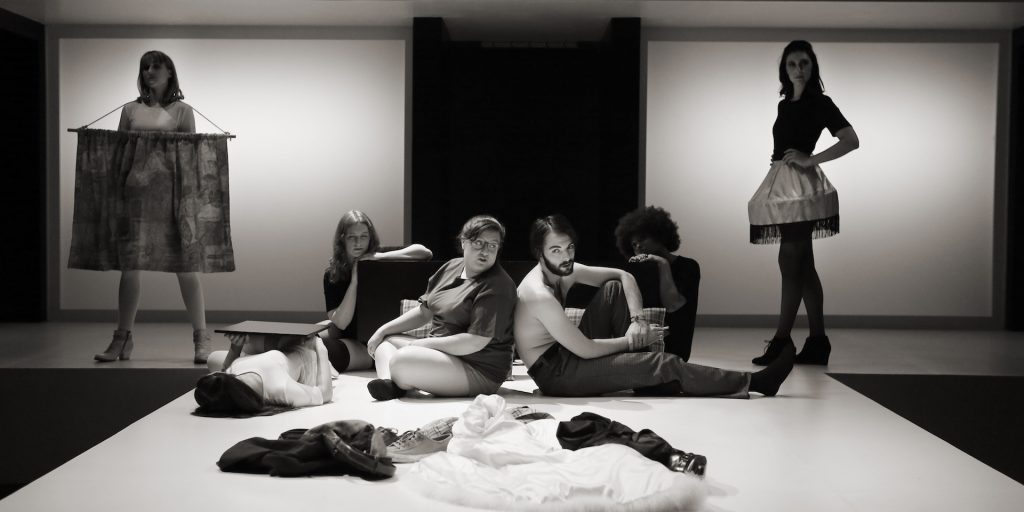
Photo: Sue Kessler
We leave Karp’s show knowing that the road to be enough is not walked on a runway, but instead somewhere deeper, somewhere more internal. Jess, and all of us, have only begun the real challenge of giving up the hate inside, but we’re shown glimmers of its possibility, such as when Jess speaks to her imagined models and, for once, sees herself as just as beautiful as them. And she is—when she allows herself to feel it.
PHOTO GALLERY
PRODUCTION CREDITS
By: Sheila Callaghan
Director: Rachel Karp ’18
Scenic Design: Sarah Markley ’19
Lighting Design: Omi Furst ’18
Sound Design: Max Helburn ’18
Costume Design: Leah Mirani ’18
Make-Up Design: JoLynn DuBois ’19
Projection Design: Finley Martin ’19
Stage Manager: Eve Gertzman ’20
Cast: Olivia Bagg ’19 (Model), Miranda Coble ’19 (Model), Lucy Consagra ’18 (Esmé), Lulu Fairclough-Stewart ’19 (Louella), Brittany Kent ’18 (Model), Jessie March ’21 (Model), Finley Martin ’19 (Model), Caoilin O’Connor ’20 (Victor), Kyle Thomas ’18 (Lewis), Bianca Thompson ’19 (Jess)
Crew: Jared Klein (Technical Director), James Varkala (Assistant Technical Director), Jessica Thomas (Scenic Artist & Technical Assistant), Max Helburn ’18 (Master Draftsman), Jessie Hamilton ’20 (Assistant Stage Manager), Mary Harriman ’20 (Assistant Stage Manager), Julia Guy ’19 (Assistant Costume Designer), Bridget Kurr ’20 (Assistant Costume Designer), Chloe Brush ’18 (Props Master), Ella Long ’20 (Wardrobe Head), Lea Tanenbaum ’19 (Master Electrician), Taylor Jaskula ’21 (Assistant Master Electrician), Madeleine Lee ’20 (Light Board Operator), Cara Geser ’20 (Sound Board Operator)
***
Kallan Dana ’19 is an English/Theater double major and Staff Writer for the Living Newsletter.















